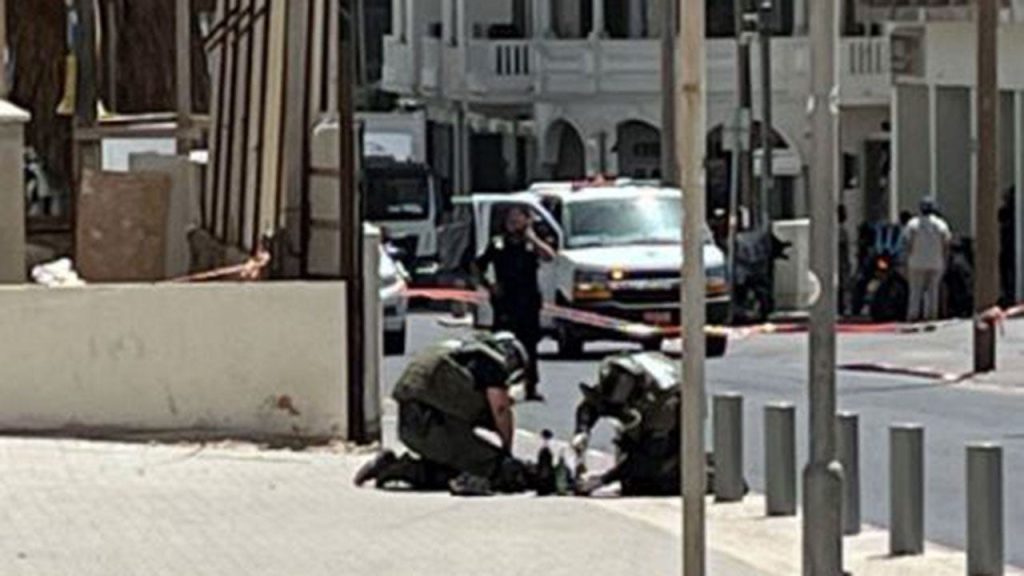An American citizen has been charged with attempting to firebomb a branch office of the U.S. Embassy in Tel Aviv, Israel. The suspect, identified as Joseph Neumeyer, 28, reportedly arrived in Israel in April and made social media posts indicating his intentions to target the embassy. Following his arrest, Neumeyer faces serious federal charges, which could result in a lengthy prison sentence if convicted.
| Article Subheadings |
|---|
| 1) Overview of the Incident |
| 2) Details of the Charges |
| 3) Social Media Influences |
| 4) Response from Authorities |
| 5) Potential Legal Consequences |
Overview of the Incident
The recent charges against Joseph Neumeyer highlight a significant threat to U.S. diplomatic missions abroad. On Sunday, the U.S. Department of Justice revealed that Neumeyer had been apprehended outside a branch office of the U.S. Embassy in Tel Aviv, where he was found carrying a backpack filled with Molotov cocktails—improvised incendiary devices typically associated with violent protests and attacks. This alarming development comes at a time when tensions regarding U.S. foreign policy are inflamed, adding a layer of complexity to international relations in the region.
Reports surrounding Neumeyer’s actions state that he approached the embassy office, spat on a guard, and attempted to flee the scene when confronted. Fortunately, no injuries occurred during the incident, although the altercation poses serious questions regarding security protocols at diplomatic facilities.
Details of the Charges
Neumeyer is facing serious charges under U.S. law, specifically attempting to destroy property by means of fire or explosives. According to prosecutors, the contents of Neumeyer’s backpack were deemed as lethal devices intended to cause significant harm and chaos at the embassy. U.S. Attorney Joseph Nocella, Jr. stated, “
As alleged, Neumeyer, armed with potentially lethal devices, sought to cause chaos and destruction at the United States Embassy in Tel Aviv.
“
The FBI has indicated that they consider this an important case, reflecting a broader commitment to safeguarding American lives and interests overseas. As Neumeyer was deported back to the U.S. after his arrest, he made his first appearance in a federal courtroom in New York, where he was ordered to be held without bail pending trial.
Social Media Influences
Investigators have pointed out that Neumeyer made several threatening posts on social media just days prior to his attempted attack. On May 19, he allegedly took to Facebook to incite violence and showcased his intentions to target the embassy. One of his posts included a direct call to action: “
Join me this afternoon in Tel Aviv; we are burning down the U.S. embassy.
“
Such posts not only indicate a premeditated plan but also underline the role that social media can play in mobilizing individuals for acts of terrorism or violence. This insight raises critical discussions on how law enforcement can utilize digital footprints to preemptively thwart potential threats to public safety.
Response from Authorities
The incident prompted immediate action from local law enforcement agencies, who were called to the scene to neutralize the incendiary devices Neumeyer had brought. Officers from the Israeli National Police, including an explosive ordinance disposal team, successfully rendered the Molotov cocktails safe without any injuries occurring. This response highlights not only the potential dangers associated with such homemade explosives but also the need for heightened vigilance at embassy locations.
Officials from the FBI have emphasized their determination to pursue individuals who threaten U.S. citizens and diplomatic missions abroad. Steven Jensen, Assistant Director in Charge of the FBI, remarked, “
Let his arrest carry an unmistakable message: The FBI and our partners will aggressively pursue those who attempt to harm U.S. citizens and interests abroad.
“
Potential Legal Consequences
If convicted, Neumeyer faces a maximum sentence of up to 20 years in prison. The ramifications of this case extend beyond the individual, potentially impacting U.S. diplomatic relations in Israel and complicating the political landscape. The U.S. government maintains strict protocols concerning threats to its embassies and has a robust legal framework to address terrorist acts, further indicating the seriousness with which these matters are treated.
Moreover, this incident has reignited discussions around the increased security measures that may be necessary at foreign embassies, particularly in regions already prone to political unrest or hostility toward the United States. As this case unfolds, legal experts will be closely monitoring how it may set precedents for similar cases in the future.
| No. | Key Points |
|---|---|
| 1 | Joseph Neumeyer, 28, was arrested for attempting to firebomb a U.S. Embassy branch in Tel Aviv. |
| 2 | Neumeyer was found with Molotov cocktails and has been charged with serious offenses. |
| 3 | His social media postings reflected premeditated intentions for violence against the embassy. |
| 4 | Israeli and U.S. authorities responded quickly to neutralize the incendiary devices without injuries. |
| 5 | If convicted, Neumeyer could face up to 20 years in prison, influencing future legal precedents. |
Summary
The charges against Joseph Neumeyer for attempting to firebomb a U.S. Embassy in Tel Aviv bring to light the ongoing threats faced by diplomatic missions worldwide. This incident underscores the importance of robust security protocols and effective law enforcement collaboration in neutralizing potential threats to U.S. interests abroad. As details emerge, they will likely spur discussions about vigilance and preventive measures in maintaining the safety of not just embassies but U.S. citizens abroad.
Frequently Asked Questions
Question: What led to Joseph Neumeyer’s arrest?
Joseph Neumeyer was arrested after attempting to firebomb a U.S. Embassy branch in Tel Aviv, found with Molotov cocktails in a backpack.
Question: What are Molotov cocktails?
Molotov cocktails are homemade incendiary devices made of glass bottles filled with flammable liquid and are often used in protests and violent confrontations.
Question: What might happen next in this case?
Neumeyer faces a trial where he may be convicted and sentenced up to 20 years in prison if found guilty of his charges.



